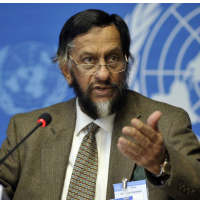Pachauri Replaced at TERI Amid Sexual Harassment Allegations
 Dr. Rajendra K. Pachauri (file photo)
Dr. Rajendra K. Pachauri (file photo)
The former UN climate change panel (IPCC) chief, Dr. Rajendra Kumar Pachauri, has been removed from his post as head of The Energy and Resources Institute (TERI) in Delhi. The move came days after a court allowed Pachauri to return to his office while facing sexual harassment allegations.
TERI’s governing council announced on Thursday that Pachauri was being replaced as its director general by Ajay Mathur, a former World Bank official and one of the members of the Prime Minister's council on climate change.
The statement praised Pachauri's work in turning TERI into "a major, financially autonomous, professionally dynamic organisation on the global stage". While not specifying why he was being replaced, the statement said that "the interests of TERI and its talented staff are paramount".
The police are investigating a sexual harassment complaint from a 29-year-old woman working in the TERI office in Gurgaon.
Lawyers for the woman say the harassment included unwanted emails as well as text and phone messages. 74-year-old Pachauri has denied the allegations, saying his email and phone accounts had been hacked. No formal charges have been brought against him yet.
In February, he resigned as the IPCC head after the sexual harassment allegations surfaced.
When a court gave permission last week to Pachauri to return to work at the Delhi-based TERI, a number of his colleagues reportedly expressing their unease over his return.
The governing council, headed by astrophysicist BV Sreekantan, subsequently met in Bangalore on Thursday and decided to appoint Mathur in Pachauri’s place. The council has 10 members including HDFC chairman Deepak Parekh, Naina Lal Kidwai of the HSBC, Kiran Mazumdar Shaw of Biocon and the ministry of earth science secretary Shailesh Nayak.
The council said in its statement that the search for Pachauri’s replacement had begun in September 2014, well before the allegations.
"The decision to appoint Ajay Mathur is, therefore, the culmination of an extensive search process and an intensive evaluation of candidates from across the globe," the statement said.
In 2007 Pachauri had collected the Nobel Peace Prize on behalf of the IPCC for its work in the scientific assessment of the risks and causes of climate change. The organisation shared the award with former US vice-president and environmental campaigner, Al Gore.
- Karan Singh
To Learn More:
Sexual-harassment case: Teri sacks RK Pachauri (by Vishwa Mohan, Times of India)
UN climate head Rajendra Pachauri removed from Delhi office (BBC News)
Rajendra Pachauri scandal: No removal, it seems to be only a send-off, says complainant (Economic Times)
Profile: Till his sacking, R K Pachauri was the face of TERI (by Amitabh Sinha, Indian Express)
Rajendra Pachauri: Climate expert resigns over harassment claim (by Tom Bawden, The Independent)
- Top Stories
- Controversies
- Where is the Money Going?
- India and the World
- Appointments and Resignations
- Unusual News
- Latest News
- India College Chain’s Expansion into U.S. Draws Opposition from Massachusetts Officials over Quality of Education
- Milk Shortages in India Tied to Release of New Movies Featuring Nation’s Favorite Stars
- Confusion Swirls around Kashmir Newspaper Ban in Wake of Violent Street Protests
- Polio-Free for 5 Years, India Launches Vaccine Drive after Polio Strain Discovery
- New Aviation Policy Could Increase Service, Lower Ticket Prices






Comments